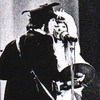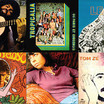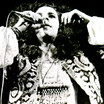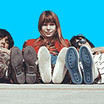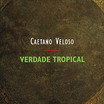Ruídos pulsativos

Musical Heirs
TROPICALISM: INTERVENTION AND INSERTION
Luiz Tatit
In the overall frame of our artistic culture, the influence of Tropicalism in Brazilian song may be considered under two equally important angles. The first one sees Tropicalism as an act of abrupt – and to a point unexpected – intervention at a crucial boiling point in popular music in Brazil. The second angle examines the movement as a gesture of insertion that has become perennial at song level, and whose counterpoint is the gesture of singling out introduced by bossa nova. Let’s take a look at them.
Tropicalism as intervention
In 1967, all of expressive Brazilian music fit into one single TV channel. Every faction, from the most political MPB to the most alienated iê-iê-iê
– as they called it at the time – spanning the rooted samba of the young Chico Buarque, the old gang represented by Elizeth Cardoso, and the generous musicality of Elis Regina and Wilson Simonal, everyone had their headquarters at TV Record. The Brazilian state, with the military class in power, was making its way towards the harshest dictatorship in its history with the signing of the Institutional Act 5 (known as A.I. 5) the following year. The students’ movement was reaching its peak as it reacted against official decisions. In order to face the government’s tyrannical discourse, all of the country’s intellectual and artistic class found themselves adopting a left-wing stand: it could be a radical, moderate, or “festive” left, but left it was. It was hard to develop an intellectual or artistic activity that, after a while, wouldn’t ideologically belong to some left-wing manifestation (leaning towards communism) or a right-wing one (leaning towards North-American imperialism). Maniqueism was then the only form of thought duly authorized by both sides.
The typically capitalistic TV Record was open to all of the times’ tendencies, as long as the representing artists guaranteed acceptable audience levels. As a result, several groups of artists were formed by ideological affinity, each of them being in charge of a weekly program and competing for the highest degree of popular embrace. In order to increase the competition even further and consolidate popular music as a product that was winning the consuming public’s preference, old channel 7 started organizing each year the famous festivals of Brazilian popular music, enhancing the confrontation between the trends and contributing to the revelation of new leaders and representatives.
At that same time the monogram MPB was created for Brazilian Popular Music as an opposition to the political forces (e.g.: MDB) at work off the air. Born during the bossa nova period, the then called modern Brazilian popular music started to slowly change its aesthetic project for a political engagement. Tom Jobim and João Gilberto, the key craftsmen of the bossa-nova movement, were living in the USA and were hardly familiar with the new Brazilian reality, let alone the path taken by their former work mates. Nara Leão, Carlos Lyra, Sérgio Ricardo and so many others who had stayed in the country were no longer speaking of love, smiles and flowers; instead, they talked about the underdeveloped conditions of the Brazilian people, the country folk, the city hills, the slums, and made special reference to the changes that would happen on a “day that was to come.”
The new generation of “bossa nova maintainers” arrived when the wave of political music was already making its course and, by virtue of a historic contingency, became the greatest representatives of the intense students’ struggle fought off television. When they sang at TV Record’s festivals, composers such as Edu Lobo, Dori Caymmi, Gilberto Gil, Marcos Valle, Chico Buarque, Caetano Veloso, and Geraldo Vandré represented the voice of the youth that wouldn’t put up with the military dictatorship and who wanted the country untouched by the capitalist influence.
There’s no doubt that Paulo Machado de Carvalho’s company made financial profits from the presence of those talented young artists, particularly at the time of festival competition. However, the true gold mine, which, since 1965 guaranteed Record’s viewer leadership, was a show called Jovem Guarda, commanded by Roberto Carlos, who, unclad of any dogmatic ideology, unknowingly followed to the letter the only ideology that interested his bosses: the results.
At this point, the times’ maniqueism had already been assimilated by the station’s politically engaged wing. Whoever wasn’t making “protestation” MPB, was somehow at the services of American imperialism, be it by adoption, omission or alienation. The Jovem Guarda belonged to the latter, and it was worshipped by the silent majority, but despised – if not ostracized – by the militant minority. Roberto Carlos’s participation as a singer at the festival of popular music, fostered by the station’s management, caused great indignation by the so-called “hard-liners” of the MPB. Their hissing only increased the rage of Roberto’s sympathizers. After all, Jovem Guarda was a pale, yet efficient, national reproduction of Anglo-Saxon rock ‘n roll that had produced mega-artists such as Elvis Presley and the Beatles, who had been exported all over the world. But the strength of the music representative of global capitalism had gone much beyond the naïve rock ‘n roll of the early 60’s. In 1968, the international music scene had already suffered the impact of the album Sargent Peppers Lonely Hearts Club Band; it had already watched the ascension of the Rolling Stones, and was living the hippie era, substantiated by expressions such as Jimi Hendrix, Janis Joplin and Joe Cocker.
From the effervescence of rock and of international counter-culture, and from the maniqueism that characterized the political and cultural life in Brazil, particularly from the relations among the music groups dwelling in the microcosm of TV Record, Tropicalism appears as an intervention. Its main leaders, Gilberto Gil and Caetano Veloso, deriving from the purest MPB, felt the time had come to proclaim the insignificance of our domestic dictatorship, which was so pettily harmful to the country’s population, in view of the magnitude of the cultural (particularly musical) happenings going on throughout the planet, and mainly to denounce the inverted reproduction of the national maniqueism found in the famous music festivals (already transferred at this point from Record to Globo). Without realizing what was going on, left-wing artists and public, created a consensus about the musical and poetic form of the “true” MPB, which should be restricted to acoustic instruments, regional rhythms, themes connected to the earth or messages of hope in the near future. At the most, they admitted the diction of traditional samba which one way or another sang Brazil. In a subtle and probably unconscious way that was the launch of a despotic selective project of Brazilian music and aesthetics.
In this context, it wasn’t Caetano Veloso’s and Gilberto Gil’s personal records, and neither was it the collective work “Tropicália” ou “Panis et circensis” who were mostly responsible for the impact of the tropicalist intervention. These records illustrated, in fact, the lasting shape of the movement, which still today influences musicians and other artists. The most sensitive deed of this intervention took place on September 15th, 1968, on the stage of Teatro Tuca, in São Paulo, during the song “Proibido proibir” by Caetano, backed by the group Mutantes, presented at one of the finals of the 3rd International Festival of Song. The full context of the event included the elimination, at a previous exhibition, of the song “Questão de ordem” by Gilberto Gil.
Both compositions incorporated in their lyrics powerful aspects of the students’ movement of the time, dislocating them from the predictable scenes into which they were inserted. “Questão de ordem” already addressed in its title (“a matter of order”) the expression exhaustively pontificated at students’ assemblies, every time the representatives competed to have the word. The somber seriousness that reigned at these meetings was approached by the composer from an anarchist standpoint (“as a matter of disorder”), tempered with a pinch of eroticism. The obstinate commitment to the “cause” was replaced with an impulse towards objects of desire (“Quem sair demora / O quanto for preciso / Em nome do amor” – “if you leave, you will take / as long as you need / in the name of love”). “Proibido proibir” (“Forbidden to forbid”) referred to the students’ movement which, in May 1968, had made automobiles burn in Paris. The slogan that named the song was written on the walls of the French capital, demonstrating the dissatisfaction of the young with the already tired and never-ending Gaullisme that controlled the nation since the end of WWII. Caetano used the paradox contained in the expression, as it practices exactly what it represses, to lay bare the contradiction of the Brazilian left: it reproduced in its ranks an implicit censorship to all pieces of work that weren’t aligned with “revolutionary goals”.
Therefore, by adopting the same overall theme in both songs, the tropicalist virus was implanted at the core of the crusade undertaken by the militant left, denouncing its one-way character and, at the same time, testing its capacity to tolerate differences. The unmistakable signs of this posture were found in the attitudes programmed for the event: electric guitars, a symbol of the alien pop-rock, the extravagant and irreverent clothes that were not very compatible with the ideal of the serious revolutionary left, the ambiguous sexual behavior, the format (screaming, unexpected participations, poetic interventions), etc. The fundamental and less obvious performance, however, took place at the level of the very sound of the songs presented: “Questão de ordem” and “Proibido proibir” are examples of the decomposition of the song into prosaic language. Some explaining is required here.
Brazilian song was erected on a chanted base without which it is difficult to understand its history. Developed early in the century by representatives of a completely oral culture, the practice of establishing a relationship between melody and lyrics slowly configured itself as the technical means to its fixation consolidated themselves. The development of a popular composer, as we know, corresponded to the development of any speaker of the mother tongue: he knew how to express himself with linguistic and chanted units naturally compatible among them. In other words, the composer practiced our simple colloquial language. However, he had the aptitude to extract from this everyday language melody and text combinations that deserved to be preserved because they had some aesthetic value. They produced repeated forms, choruses, regular transitions and everything that might contribute to the memorization of the created material. We all know that, without such resources, the product of spoken language is lost soon after the transmission of the message. Of course, the first recordings in cylinders, whose technology was coming to Brazil at the turn of the century, were also decisive to the fixation of these works that only rarely were transcribed into a sheet of music.
The same everyday speech that originated popular song became, with the years, a source of threat to its stabilization processes. If spoken language weren’t sufficiently camouflaged within song through “musical” memorization resources (fixation of pitch, configuration of rhythmic themes, etc.) final composition might have the same fate as our everyday conversation: disappearance. So, we might say that composers have repressed, either consciously or unconsciously, the presence of oral language which, notwithstanding their desire, responded through the persuasive force of any song. Whenever possible, they avoided composing along the line of pure inflections to stay away from the risk of impregnating it with its natural instability.
Even so, the presence of colloquial language ended up invading a few stylized sambas (Coversa de botequim, Palpite infeliz etc.), in the brakes of the sambas-de-breque, in dialogues within songs (Sinal fechado, Sem fantasia etc.), in interjections or everyday expressions found in the song or in genre that adopt it as an identity factor (rap, hip-hop, etc.). If, in theory, popular composition may be defined as a purification process and aesthetic settlement of everyday talk, the reverse road, from talk to song, may be taken as a decomposition process and a dive into instability. This is made evident in the fact that compositions that remain parallel to colloquial language are difficult to perform from a technical standpoint, as musical resources are not enough. It is necessary to look at each expression and how they suggest different inflections.
Whatever the case may be, Gilberto Gil’s and Caetano Veloso’s songs reached the pinnacle of their transgression when they melted into speech, so to speak. In “Questão de ordem”, Gil took the theme of a students’ assembly, with its nationalistic content to the border line of the most hysterical international rock, converting the sound of the words into screams of trance which, at the end, turned into a sort of agony where voice and body seemed to constitute one single decomposing element. Exclusively for its attitude, in other words, regardless of any musical consideration, the song was eliminated from the festival’s first eliminating phase.
“Proibido proibir”, even though it was inserted in the same anarchic context as the other song – further stressed by the irreverence of singer Caetano Veloso and of the highly electrified sound of the Mutantes – had a “friendlier” melodic profile, somewhere between the marchinha
and the iê-iê-iê, which allowed for its initial classification, despite the heated public protest. At the second performance, under incessant booing by the audience, as they supported music with an ideological definition – Geraldo Vandré was then the model to be followed –, Caetano Veloso sang up to a point, after which he made a long declaration about the conflicts involved in that precise moment, about the aesthetically conservative attitude of the affiliates of political revolution, about the similarly truculent methods used by the right and by the left, about the incompetence and bias of the festival judges in making their choices, etc. This long “brake”, which immersed the composer in the center of oral language, determined the impossibility of returning to song. As he tried to pick up the song’s melody again, Caetano’s voice – at this point the artist could hardly hear the sound of the instruments – faltered in the pitch and decided to adopt once and for all the inflections of speech, which is purposefully “off key” and off the melody. This is the central point of the tropicalist dissolution, which translated into a decomposition of the very song into instabilities typical of everyday language. The composer presented the work into a holocaust in order to denounce a state of things that had become intolerable.
This tropicalist intervention had its counterpoint 25 years later, with the release, by the two leaders of the movement, of the CD Tropicália 2. Brazil, as it was living in democracy, needed to prove that it was able to equate its own problems and correct its indisputable distortions – if not perversions and addictions – which kept (and which still keep to this day) the country at the back of the new world order. The composers took the inverted route: they started the album with the raw talk of the rap beat (Haiti) and went off looking for ordering “spaces” represented by long stable vocal durations in some songs choruses (as is the case of the same song, Haiti) or in entire compositions (such as Aboio or Desde que o samba é samba). The direction had inverted itself: now it went from decomposition (talk) to composition (song).
Tropicalism as insertion
The long-term project of Tropicalism can be defined by the term inclusion. It is a long range gesture, and it is here to stay, but it was born out of the specific context portrayed above. As we’ve seen, there was a moment on TV Record when politically engaged MPB selected or eliminated a production according to its ideological content. The immediate consequence of this usually maniqueistic appraisal was the exclusion resulted from the downgrading of artists who were unengaged with the “cause”. Caetano Veloso reveals a fact in the book Verdade tropical (page 282) that is highly representative of the exclusive behavior that surrounded artists in the late 60’s.
The author says that, after the success of Disparada, Geraldo Vandré suggested to manager Guilherme Araújo that he laid all his chips on publicizing Vandré’s own name, as he was the most genuine Brazilian representative of Latin American political music, and that he should discard any bets on tropicalist musicians, since, according to the composer of Caminhando, the rhythm of the market only allowed one exponent at a time. Leaving aside whatever personal ambitions the artist might have, his clearly excluding methods contributed to define in every detail the tropicalist aspiration that went in the opposite direction. The artists from Bahia leaned towards the inclusion of the broadest diversity possible, assimilating both prestigious and little known genres from Brazilian and international music.
Because Caetano Veloso and Gilberto Gil were always profound admirers of the bossa nova of João Gilberto and Tom Jobim, one might suppose that they were already feeling the need for a gesture that complemented the fundamental contribution made by these two musicians. Bossa nova had eliminated a few excesses of Brazilian song – particularly the passionate excess that had come over it in the 1950’s – and had developed a sort of absolute song, sung with rhythm, harmony and volume that were precisely calculated to allow a compatibility between melody and words. It had therefore fostered a sifting of popular music, which became forever a model for the sanitation of the national repertoire. Since then, most renowned artists have bathed their repertoire in bossa nova waters (which is considered a gesture and not a style). The acoustic projects, so fashionable nowadays, illustrate the sobriety and selectiveness suggested by bossa nova.
Tropicalism underscores that Brazilian song needs all dictions that formed it in order to configure itself fully. It needs the bolero, the tango, rock, rap, reggae, regional rhythms, tacky music, new music, and obsolete music. In short, it needs all the trends that cross or have crossed the country at some point in its history. Apparently irresponsible, – or even fickle – for its lack of a selective set of criteria, the tropicalist gesture in fact presupposes the bossa nova gesture. Tropicalism includes while bossa nova selects. They are both long-term gestures that will endure in Brazilian culture as the “rule and compass” that regulate the musical production.
Exclusive for Tropicalia website.






